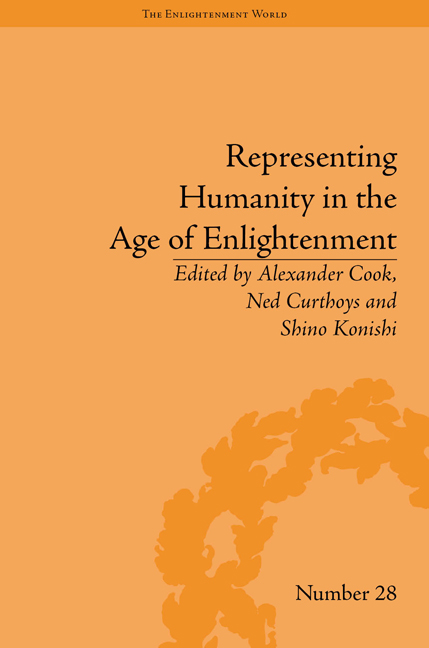Book contents
- Frontmatter
- CONTENTS
- Acknowledgements
- Dedication
- List of Contributors
- List of Figures
- The Science and Politics of Humanity in the Eighteenth Century: An Introduction
- Part I Humanity and the Civilizing Process
- 1 Representing Humanity during the French Revolution: Volney's ‘General Assembly of Peoples’
- 2 Representing Woman: Historicizing Women in the Age of Enlightenment
- 3 Sheer Folly and Derangement: How the Crusades Disoriented Enlightenment Historiography
- 4 Turning Things Around Together: Enlightenment and Conversation
- 5 Moses Mendelssohn and the Character of Virtue
- Part II Encountering Humanity
- Part III The Limits of Humanity
- Notes
- Index
5 - Moses Mendelssohn and the Character of Virtue
from Part I - Humanity and the Civilizing Process
- Frontmatter
- CONTENTS
- Acknowledgements
- Dedication
- List of Contributors
- List of Figures
- The Science and Politics of Humanity in the Eighteenth Century: An Introduction
- Part I Humanity and the Civilizing Process
- 1 Representing Humanity during the French Revolution: Volney's ‘General Assembly of Peoples’
- 2 Representing Woman: Historicizing Women in the Age of Enlightenment
- 3 Sheer Folly and Derangement: How the Crusades Disoriented Enlightenment Historiography
- 4 Turning Things Around Together: Enlightenment and Conversation
- 5 Moses Mendelssohn and the Character of Virtue
- Part II Encountering Humanity
- Part III The Limits of Humanity
- Notes
- Index
Summary
One could try to create a new canon – one in which the mark of a ‘great philosopher’ was awareness of new social and religious and institutional possibilities, as opposed to developing a new dialectical twist in metaphysics or epistemology.
Richard Rorty, ‘Habermas and Lyotard on Postmodernity’(1984).As a seminal Aufklärer who exemplified the promise of German-Jewish participation in German culture, the philosophically self-educated and belletristically inclined Moses Mendelssohn (1729–86) continues to be interpreted as a case study in German-Jewish Bildung. Resistant to easy translation, I will provisionally define Bildung as a socially and aesthetically mediated process of self-education. Mendelssohn himself, largely philosophically self-taught, exemplifies the classic trajectory of Bildung as a quest for self-creation. As a teenager he undertook a traditional religious education within a closed Jewish community in Dessau and then enjoyed a successful philosophical career, participating in the elite circles of the Aufklärung after his move to Berlin in 1743. Mendelssohn was the first illustrious German Jewish public intellectual, of great repute throughout Europe for his writings on metaphysics, aesthetics, political theory and Judaism. Given his close association with the German and Jewish Enlightenments, the Aufklärung and Haskalah, and his status as an important advocate of Jewish emancipation, Mendelssohn has come to represent an ambivalent symbol of the fraught relationship between Judaism and Western modernity.
- Type
- Chapter
- Information
- Representing Humanity in the Age of Enlightenment , pp. 65 - 78Publisher: Pickering & ChattoFirst published in: 2014



